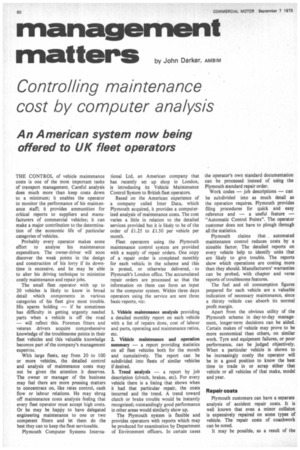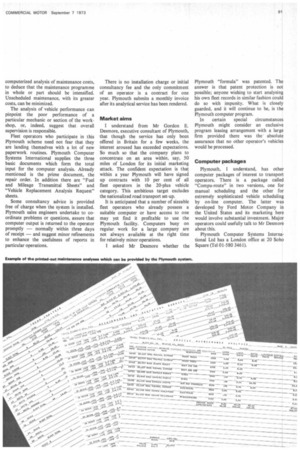management
Page 92

Page 93

If you've noticed an error in this article please click here to report it so we can fix it.
matters by John Darker AMB M
Controlling maintenance cost by computer analysis
An American system now being offered to UK fleet operators
THE CONTROL of vehicle maintenance costs is one of the most important tasks of transport management. Careful analysis does much more than keep costs down to a minimum; it enables the operator to monitor the performance of his maintenance staff; it provides ammunition for critical reports to suppliers and manufacturers of commercial vehicles; it can make a major contribution to the determination of the economic life of particular categories of vehicles.
Probably every operator makes some effort to analyse his maintenance expenditure. The owner-driver will soon discover the weak points in the design and construction of his lorry if its downtime is excessive, and he may be able to alter his driving technique to minimize costly maintenance and repair jobs.
The small fleet operator with up to 20 vehicles is likely to know in broad detail which components in various categories of his fleet give most trouble. His spares holding — if he sometimes has difficulty in getting urgently needed parts when a vehicle is off the road — will reflect this. Foremen fitters and veteran drivers acquire comprehensive knowledge of the troublesome points in their fleet vehicles and this valuable knowledge becomes part of the company's management expertise.
With large fleets, say from 20 to IOU or more vehicles, the detailed control and analysis of maintenance costs may not be given the attention it deserves. The owner or manager of the business may feel there are more pressing matters to concentrate on, like rates control, cash flow or labour relations. He may shrug off maintenance costs analysis feeling that every fleet operator must accept high costs. Or he may be happy to have delegated engineering maintenance to one or two competent fitters and let them do the best they can to keep the fleet serviceable.
Plymouth Computer Systems Interna
tional Ltd. an American company that has recently set up shop in London, is introducing its Vehicle Maintenance Control System to British fleet operators.
Based on the American experience of a company called Inter Data, which Plymouth acquired, it provides a computerized analysis of maintenance costs. The cost varies a little in relation to the detailed services provided but it is likely to be of the order of £1.25 to £1.50 per vehicle per month.
Fleet operators using the Plymouth maintenance control system are provided with a supply of repair orders. One copy of a repair order is completed monthly for each vehicle in the scheme and this is posted, or otherwise delivered, to Plymouth's London office. The accumulated repair orders are processed so that the information on them can form an input to the computer system. Within three days operators using the service are sent three basic reports, viz:
I. Vehicle maintenance analysis providing a detailed monthly report on each vehicle with a list of repairs done, cost of labour and parts, operating and maintenance ratios, etc.
2. Vehicle maintenance and operation summary — a report providing statistics on all fleet vehicles both for the month and cumulatively. The report can be subdivided into fleets of similar vehicles if desired.
3. Trend analysis — a report by job description (clinch, brakes, etc). For every vehicle there is a listing that shows when it had that particular repair, the costs incurred and the trend, A trend toward clutch or brake trouble would be instantly recognized; outstandingly good performance in other areas would similarly show up.
The Plymouth system is flexible and provides operators with reports which may be produced for examination by Department of Environment officers. In certain cases the operator's own standard documentation can be processed instead of using the Plymouth standard repair order.
Work codes — job descriptions — can be subdivided into as much detail as the operation requires. Plymouth provides filing procedures for quick and easy reference and — a useful feature — "Automatic Control Points". The operator customer does not have to plough through all the statistics.
Plymouth claims that . automated maintenance control reduces costs by a sizeable factor. The detailed reports on every vehicle help to identify units that are likely to give trouble. The reports show which operations are costing more than they should. Manufacturers' warranties can be probed, with chapter and verse reports of troublesome features.
The fuel and oil consumption figures prepared for each vehicle are a valuable indication of necessary maintenance, since a thirsty vehicle can absorb its normal profit margin.
Apart from the obvious utility of the Plymouth scheme in day-to-day management, longer-term decisions can be aided. Certain makes of vehicle may prove to be more economical than others, on similar work. Tyre and equipment failures, or poor performance, can be judged objectively. When a particular vehicle is shown to be increasingly costly the operator will be in a good position to know the best time to trade in or scrap either that vehicle or all vehicles of that make, model and year.
Repair costa Plymouth customers can have a separate analysis of accident repair costs. It is well known that even a minor collision is expensively repaired on some types of vehicle. The repair costs of coachwork can be noted.
It may be possible, as a result of the computerized analysis of maintenance costs, to deduce that the maintenance programme in whole or part should be intensified. Unscheduled maintenance, with its greater costs, can be minimized.
The analysis of vehicle performance can pinpoint the poor performance of a particular mechanic or section of the workshop, or, indeed, suggest that overall supervision is responsible.
Fleet operators who participate in this Plymouth scheme need not fear that they are landing themselves with a lot of new paperwork. routines. Plymouth Computer Systems International supplies the three basic documents which form the total input for the computer analysis. Already mentioned is the prime document, the repair order. In addition there are "Fuel and Mileage Transmittal Sheets" and "Vehicle Replacement Analysis Request" sheets.
Some consultancy advice is provided free of charge when the system is installed. Plymouth sales engineers undertake to coordinate problems or questions, assure that computer output is returned to the operator promptly — normally within three days of receipt — and suggest minor refinements to enhance the usefulness of reports in particular operations. • There is no installation charge or initial consultancy fee and the only commitment of an operator is a contract for one year. Plymouth submits a monthly invoice after its analytical service has been rendered.
Market aims I understand from Mr Gordon E. Desmore, executive consultant of Plymouth, that though the service has only been offered in Britain for a few weeks, the interest aroused has exceeded expectations. So much so that the company plans to concentrate on an area within, say, 50 miles of London for its initial marketing attack. The confident expectation is that within a year Plymouth will have signed up contracts with 10 per cent of all fleet operators in the 20-plus vehicle category. This ambitious target excludes the nationalized road transport set-up.
It is anticipated that a number of sizeable fleet operators who already possess a suitable computer or have access to one may yet find it profitable to use the Plymouth facility. Computers busy on regular work for a large company are not always available at the right time for relatively minor operations.
I asked Mr Desmore whether the Plymouth "formula" was patented. The answer is that patent protection is not possible; anyone wishing to start analysing his own fleet records in similar fashion could do so with impunity. What is closely guarded, and it will continue to be, is the Plymouth computer program.
In certain special circumstances Plymouth might consider an exclusive program leasing arrangement with a large firm provided there was the • absolute assurance that no other operator's vehicles would be processed.
Computer packages Plymouth, I understand, has other computer packages of interest to transport operators. There is a package called "Compu-route" in two versions, one for manual scheduling and the other for extremely sophisticated vehicle scheduling by on-line computer. The latter was developed by Ford Motor Company in the United States and its marketing here would involve substantial investment. Major operators could usefully talk to Mr Desmore about this.
Plymouth Computer Systems International Ltd has a London office at 20 Soho Square (Tel 01-580 3461).








































































































































